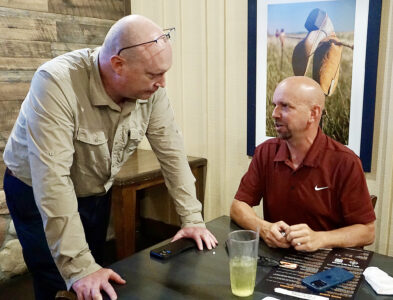Legislators address hot topics at forum
Taxes, roads, books get legislative attention

Jill Schramm/MDN Ward County Commissioner Shelly Weppler, right, talks with Andrea Travnicek, director of the Department of Water Resources, at a legislative forum in Minot Saturday.
Property taxes, highway funding, state pensions and book bans were among topics at a legislative forum held by the Minot Area Chamber of Commerce EDC Saturday.
Sen. David Hogue, R-Minot, said the Senate this past week passed two of the eight bills that came before it related to property tax.
One bill would make changes to the Homestead Tax Credit, which provides property-tax relief for seniors and people with disabilities.
“We kicked the doors off of it and we just raised all of the qualifying criteria so that a substantial increase in the number of people will be eligible,” Hogue said.
The bill eliminates the asset test and raises the income limit for a household to $100,000. It also raises the coverage amount to the first $200,000 of home value. The cost to the state to reimburse local taxing entities for the tax income is listed at $131 million.
“I think that’s a bit high because when they prepare the fiscal notes for us, they assume that there’s a 100% participation rate, and we know, historically, that has not been the case,” Hogue said.
The Senate also passed a bill to buy down 20 mills of property tax for public schools, providing about $220 million in relief to local property-tax payers, he said.
Political subdivisions looking for a more dependable revenue stream for infrastructure funding support a Senate bill to speed up how quickly state oil tax revenue flows into their coffers through the Prairie Dog program. However, Hogue said it is not a bill he supports. He explained Senate Bill 2275 moves the Prairie Dog bucket ahead of the Strategic Investments and Improvements Fund in priority for the incoming oil taxes.
Hogue said strategic investments in front of the state include construction of a $3 billion fertilizer plant near Trenton that would utilize natural gas, thus reducing flaring and creating opportunity for increased oil production. Developers have asked the state for $100 million for planning and engineering because banks aren’t interested in loaning money when there is no collateral, he said.
“While we’re going to support the counties and cities, we also realize they have to wait for their bucket to fill,” he said. “Our projections show that the counties and cities are going to get their money. Their bucket isn’t going to fill as fast as perhaps they would like, but it’s still going to fill.”
The Department of Transportation budget passed Friday in the House also provides new funding for county roads and bridges, said Rep. Matt Ruby, R-Minot.
Ward County Commission Chairman John Fjeldahl spoke to make legislators aware of public pressure for four-laning U.S. Highway 52 from Minot to Velva. Legislators in 2021 passed a bill for an environmental study along that roadway, and the state is pursuing a project to construct passing lanes, he said.
“But both economically and for safety in our region, it would be great if an environmental study could be done so we could four-lane that highway as soon as finances and your (legislators’) will allow,” Fjeldahl said.
Rep. Jay Fisher, R-Minot, said the state has not included four-laning of Highway 52 in the 2023-25 highway budget.
“I don’t think Highway 52 is as high of a priority as most of us in this region would like and have liked for the last 10 years,” he said.
In other discussion, it was noted both the House and Senate have acted on bills last Thursday that would prohibit distribution of certain books and materials due to content deemed inappropriate for minors.
House Bill 1205, which prohibits libraries from maintaining sexually explicit material, passed 65-28. Ruby said the bill requires public libraries to develop a policy and process for reviewing library collections by January 2024.
The Senate soundly defeated a bill that would have made it a Class B misdemeanor to willfully display sexually explicit materials at newsstands or business establishments where minors may be invited. However, the content remains alive in Senate Bill 2360.
On the issue of employee pensions, both the Senate and House have bills related to transitioning to a defined contribution program, such as a 401k, for new employees. The House bill would close the pension fund for new hires, while the Senate bill keeps the pension open as an option.
Hogue said the House and Senate will be working to achieve compromise on the pension bills in the final days of the session.
“We don’t have good data on how much is it going to cost to exit the plan and start transitioning new hires to a defined contribution plan,” he said. “Right now, it is about a $1.6 billion unfunded liability. It’s projected to grow, but when you’re making this transition and you don’t know the cost of the transition, that’s what’s given the Senate pause.”
Fisher said the House will be voting this week on House Bill 1371, which would allow for corporate livestock production.
Opposition comes from the North Dakota Farmers Union and others who support smaller family farms versus corporate farms. Fisher said attorneys for the state Agriculture Department and Farmers Union have been meeting to try to work out their areas of disagreement in the bill.
Funding for flood project, NAWS still intact
A Department of Water Resources bill with funding for Minot area flood control and the Northwest Area Water Supply project should get a state Senate vote this week.
There appears to be support for accelerated funding to complete the Mouse River Enhanced Flood Protection Project by 2035, said Andrea Travnicek, director of the Department of Water Resources, who participated in a legislative forum in Minot Saturday.
“It’s looking like your $76.1 million for the Mouse River flood protection project is holding on the Senate side. There’s also going to be some intent language in there to show what that five biennium (amount) is going to be,” she said. “The dollars for NAWS are sticking as well.”
The bill includes $36 million for NAWS from the Water Resources Trust Fund. The state also allocates money from federal Municipal, Rural and Industrial (MR&I) Fund to NAWS.
There have been new requirements associated with some federally appropriated dollars that could slow things, Travnicek said.
“We’re trying to get a waiver from the Bureau of Reclamation, but I know with supply chains and with the cost of projects that we might have some concerns there, but we’re still trying to be full speed ahead,” she said.
Another bill, House Bill 1218, will replace an existing NAWS advisory board with a NAWS Authority. That bill passed the House 91-0.



